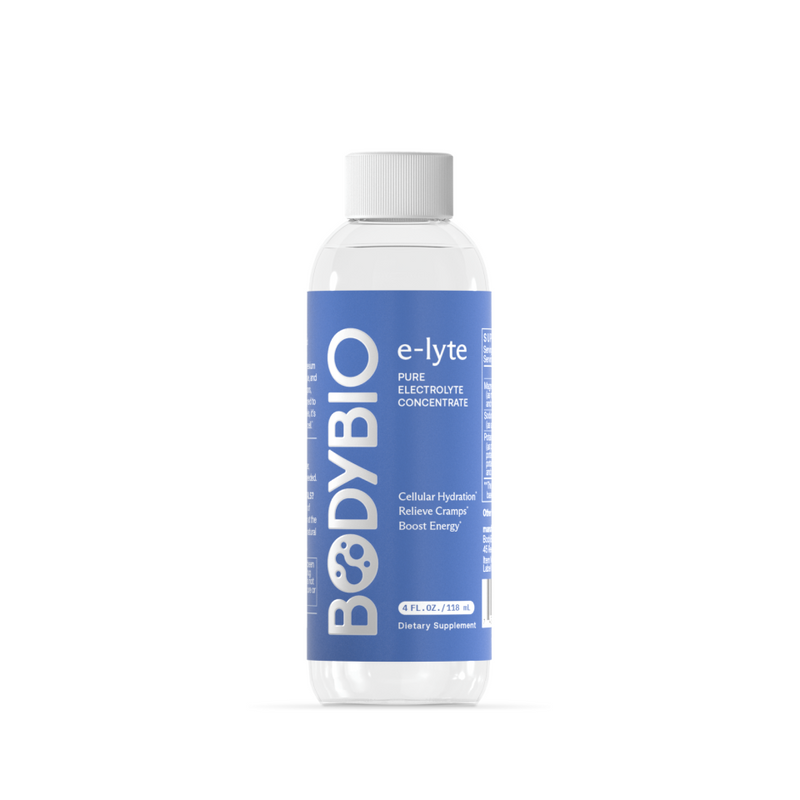Magnesium Glycinate vs. Citrate: What’s the Difference?
Authors:

Ashley Palmer
Nutritional Therapy Practitioner, Health & Wellness Expert
Key Takeaways:
If you've ever stood in the supplement aisle wondering which form of magnesium to take and why there are so many, you wouldn't be the first. Magnesium is essential for hundreds of processes in the body, from nerve signaling to muscle function to mood balance—but not all forms are created equal. Two of the most popular options on the market are magnesium glycinate and magnesium citrate, and they each offer unique benefits depending on your health needs.
Knowing the differences between these two forms of magnesium can help you decide which one is better for your personal health. From improving sleep and digestion to easing stress or muscle tension, choosing the right type of magnesium can offer targeted support for your overall wellness.
Table of Contents:
- What Is Magnesium Glycinate?
- What Is Magnesium Citrate?
- Magnesium Glycinate vs Citrate: A Side-by-Side Comparison
- What Does the Science Say About Absorption and Effectiveness?
- When to Take Magnesium Glycinate vs Magnesium Citrate
- Can You Take Magnesium Glycinate and Citrate Together?
- Magnesium Glycinate vs Citrate: How to Choose What's Best for You
What Is Magnesium Glycinate?
Magnesium glycinate is a form of magnesium bound to glycine, an amino acid known for its calming effects. Glycine plays a role in the production of neurotransmitters like serotonin and GABA, both of which influence mood regulation and sleep cycles. This chelated form of magnesium (bound to another molecule, in this case, an amino acid) offers superior bioavailability, meaning it's easily absorbed by the body and less likely to cause digestive discomfort compared to other forms.
Because it's gentle on the stomach, magnesium glycinate is often a go-to option for individuals with sensitive digestion. Its calming effect on the nervous system makes it a popular choice for addressing symptoms related to stress, migraines, sleep disturbances, and muscle tension. It's also commonly used by people managing chronic conditions such as anxiety or premenstrual syndrome (PMS), where stable magnesium levels can make a noticeable difference in overall comfort and well-being. Magnesium is also an essential nutrient during pregnancy, supporting both mom and baby throughout each trimester.
Many people often turn to magnesium glycinate for:
- Promoting deeper, more restorative sleep
- Supporting a healthy stress response and emotional balance
- Soothing muscle tension or soreness
- Supporting hormonal balance in women during PMS
- Providing a gentle option for those with digestive sensitivity
Its tolerability and multifaceted benefits make magnesium glycinate well-suited for daily use, especially when long-term support for relaxation, recovery, or emotional balance is the goal.
What Is Magnesium Citrate?
Magnesium citrate is a combination of elemental magnesium (pure magnesium not bound to other compounds) and citric acid, a naturally occurring compound found in citrus fruits. This form is known for its ability to draw water into the intestines through a process called osmosis, which can help stimulate bowel movements. Because of this, magnesium citrate is commonly used as a gentle, natural remedy for occasional constipation and sluggish digestion.
While its bioavailability is slightly lower than that of glycinate, magnesium citrate still absorbs efficiently and is widely available in powdered or liquid forms that make it easy to take, especially for those who prefer to mix their supplements into drinks or shakes.
Its digestive benefits make it particularly useful for individuals experiencing irregularity, bloating, or cramping. Additionally, it can support post-workout recovery by replenishing magnesium lost through sweat. Travelers or those with temporary dietary changes often find mag citrate helps maintain consistency and ease digestive discomfort.
Many people turn to magnesium citrate for:
- Supporting healthy, regular bowel movements
- Easing muscle cramps and spasms
- Restoring electrolytes after physical activity
- Managing occasional digestive sluggishness during travel or dietary shifts
Despite its usefulness, the citrate form can have a mild laxative effect, which may not be suitable for those with sensitive digestion or a history of gastrointestinal (GI) issues. Starting with a low dose is recommended to assess tolerance before adjusting intake.
Magnesium Glycinate vs Citrate: A Side-by-Side Comparison
Understanding how the types of magnesium differ in absorption, digestive impact, and use cases can help narrow down which one aligns better with your needs.
Here's a clear breakdown to make magnesium comparison easier:
|
Aspect |
Magnesium Glycinate |
Magnesium Citrate |
|
Absorption |
High (especially gentle on the stomach) |
Moderate to high (slightly less gentle) |
|
Primary Benefits |
Supports relaxation, stress relief, and sleep |
Supports digestion and muscle cramps |
|
Digestive Effects |
Minimal impact on bowel movements |
Can have a mild laxative effect |
|
Best For |
People with anxiety, sleep issues, or sensitive digestion |
People with constipation or occasional muscle cramps |
|
Form (commonly found in:) |
Capsules, powders |
Powders, capsules, liquid supplements |
What Does the Science Say About Absorption and Effectiveness?
Magnesium glycinate is often praised for its high absorption and minimal GI side effects. The glycine component enhances transport across the intestinal wall, making it less likely to cause diarrhea or stomach upset, a common issue with other forms like magnesium oxide or citrate. According to research, amino acid-chelated forms like magnesium glycinate show superior bioavailability and tolerability when compared to inorganic salts such as magnesium oxide.
Magnesium citrate also demonstrates efficient absorption, particularly when consumed with food or in liquid form. Its osmotic activity in the gut can promote bowel movements, making it a popular option for occasional constipation relief. However, that same mechanism may lead to GI sensitivity in some people. A clinical trial published in the Journal of the American College of Nutrition found magnesium citrate to be among the most bioavailable forms tested.
When to Take Magnesium Glycinate vs Magnesium Citrate
Taking magnesium at the right time and in the right form can enhance the benefits and help you avoid unwanted side effects. Glycinate supports rest and relaxation at night, while citrate offers digestive support and rehydration benefits earlier in the day.
|
Magnesium Form |
Ideal For |
Suggested Timing |
|
Magnesium Glycinate |
|
Evening, 1–2 hours before bed |
|
Magnesium Citrate |
|
Morning or earlier in the day |
Still, everyone is different, and you may find benefits taking mag glycinate earlier in the day or mag citrate at night. Don't be afraid to experiment with timing and dosing as needed.
Can You Take Magnesium Glycinate and Citrate Together?
Yes! And for some people, this combination can be highly effective. Taking both allows you to experience the calming, muscle-supportive effects of glycinate while still promoting digestive regularity with citrate. If you go this route, aim to separate the doses: take citrate in the morning and glycinate in the evening.
Just be mindful of your total daily magnesium intake. Too much, even from high-quality forms, can lead to loose stools or GI upset. You can also consult your healthcare provider to find the right dose for you.
Magnesium Glycinate vs Citrate: How to Choose What's Best for You
Magnesium glycinate and magnesium citrate each serve distinct purposes, making the best choice highly dependent on your personal wellness goals. Glycinate shines in its ability to support relaxation, emotional balance, and restorative sleep, making it a great fit for those managing stress or seeking gentle, daily supplementation. Citrate, on the other hand, offers reliable digestive support and helps restore electrolyte balance, particularly after exertion or dietary shifts.
- Choose magnesium glycinate for sleep, stress relief, muscle recovery, and gentle absorption.
- Choose magnesium citrate for regularity, digestive support, or replenishing electrolytes.
- You can also use both strategically—glycinate at night to unwind, and citrate earlier in the day for digestive and hydration support.
Knowing the benefits of each allows for a more intentional approach to supplementation. If you're still unsure, consult with a healthcare provider to tailor your magnesium routine to your body's specific needs.


